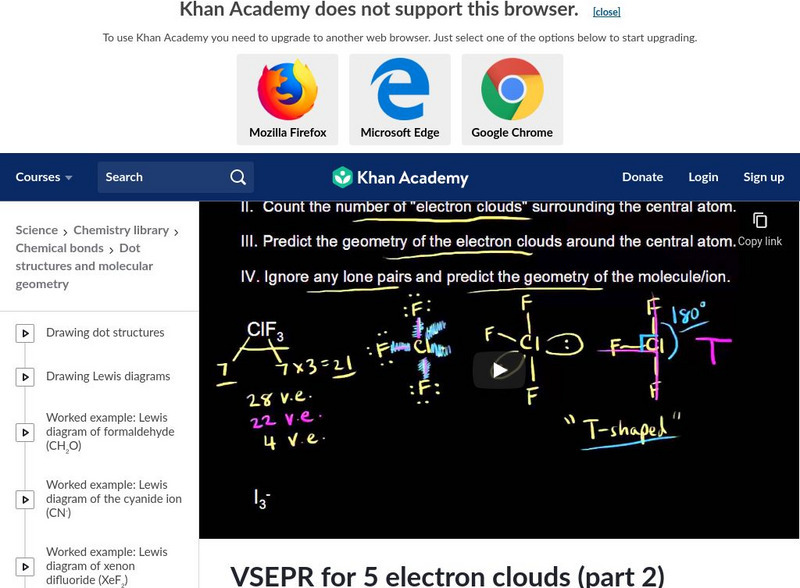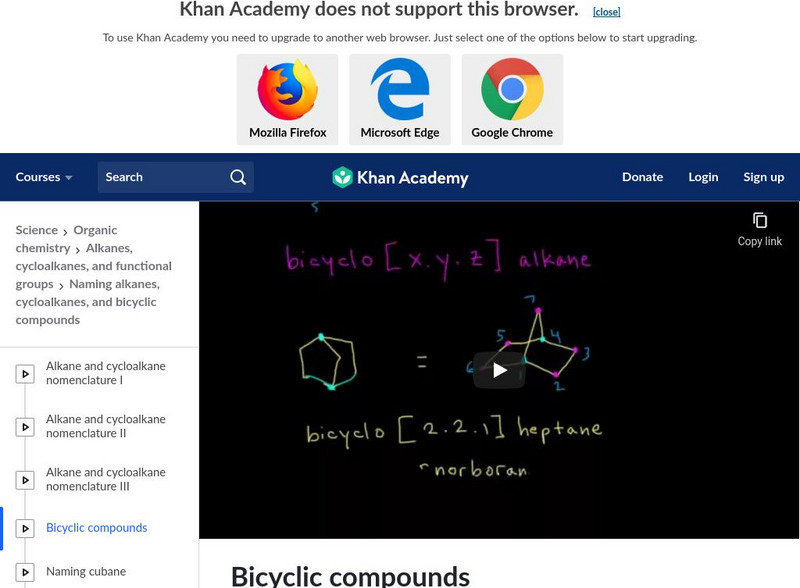Fuse School
Testing Alkenes with Bromine Water
Scholars think color-change tests are the best! Show them how to differentiate between alkanes and alkenes using a short video. The narrator guides them through the test and the reactions that occur for alkenes. Other topics include...
Fuse School
Coal, Oil and Gas Hydrocarbons
Where do the hydrocarbons we use for energy come from? Science scholars learn the origins of our fossil fuels in a short video. The animated video includes information on how fossil fuels formed, their uses, and how a number of useful...
Fuse School
Green Chemistry - Principle 12
With so many possible sites to bond with, how can chemists ensure that they can produce only the product they seek? The 12th and final video in the green chemistry series has pupils observe how to use derivatives to isolate functional...
SciShow
IDTIMWYTIM: "Organic"
About 18 percent of the human body is carbon, yet carbon found in its pure form in nature forms graphite and diamonds, which are nonliving things. The narrator explores the word organic, explaining how its meaning in science has changed...
Bozeman Science
Molecules of Life
Introduce the macromolecules that make up living organisms. An instructive explains functional groups, dehydration and hydrolysis, and the four types of macromolecules. Video is the seventh in a series of 10.
Khan Academy
R,S (Cahn-Ingold-Prelog) Naming System Example 2, Organic chemistry
Repetition of the naming rules and numbering of carbons after diagramming a molecule will help your aspiring chemists. The video builds upon previous examples of naming enantiomers and stereoisomers.
Khan Academy
Cyclic Ethers and Epoxide Naming, Organic Chemistry
An informative video focuses on the categories of ethers, specifically defining the cyclic subset of ethers. Sal examines epoxides and explains why they are significantly more reactive than the generally stable ethers.
Khan Academy
Aldehyde Introduction, Aldehydes and Ketones, Organic Chemistry
Sal clarifies a description that he missed in prior videos about the strong smell of amines. He then recaps and compares many of the small and large aldehydes, taking the opportunity to describe their structure and the progression of...
Khan Academy
Ether Naming and Introduction, Organic Chemistry
Beyond using ethers as an example of an aprotic solvent (as in most of the previous videos), Sal describes the molecule diethyl ether with its IUPAC name and provides more detail about its properties. This video assumes your class will...
Curated OER
Identifying Organic Compounds
Explore the world of organic compounds. Each type of organic compounds are described in terms of their bonds to other hydrocarbons. Ethers, alcohols, aldehyde are only some of the exciting compounds viewers will encounter.
Khan Academy
Zaitsev's Rule, Substitution and Elimination Reactions, Organic chemistry
Discuss the likelihood of ions donating electrons and then forming double bonds with an educational video. It demonstrates the methods for determining which molecules will react with others. Your class will appreciate the review.
Khan Academy
Chiral Examples 2, Stereochemistry, Organic chemistry
After providing two more examples of diagramming in different ways, Sal reviews that a molecule that cannot be superimposed on its own mirror image is defined as chiral. The terms given to the chiral center carbon are provided.
Khan Academy
Introduction to Chirality, Stereochemistry, Organic chemistry
An introduction to chirality and whether molecules can be superimposed or not. The terminology for those molecules is given along with the relevance of that characteristic.
Khan Academy
Chair and Boat Shapes for Cyclohexane, Organic Chemistry
After recapping the tetrahedral shape of a regular methane molecule and the standard 109-degree angles between hydrogens, Salman Khan demonstrates the chair and boat diagrams to represent cyclohexane. A primary focus of these diagrams is...
Khan Academy
Khan Academy: More on the Dot Structure for Sulfur Dioxide
Use this tutorial to learn how to analyze different ways to draw the dot structure for sulfur dioxide. [4:28]
Khan Academy
Khan Academy: Vsepr for 4 Electron Clouds
VSEPR for molecules with four electron clouds including examples for tetrahedral, trigonal pyramidal, and bent molecules. [10:05]
Khan Academy
Khan Academy: Vsepr for 5 Electron Clouds Part 2
Part II of using VSEPR for five electron clouds including examples for T-shaped and linear molecules. [10:48]
Khan Academy
Khan Academy: Vsepr for 6 Electron Clouds
Learn about VSEPR for six electron clouds, and see examples for octahedral, square pyramidal, and planar molecules. [12:29]
Khan Academy
Khan Academy: Organic Chemistry Naming Examples 2
Find organic chemistry naming examples involving branching and rings [10:22]
Khan Academy
Khan Academy: Organic Chemistry Naming Examples 4
Sal Khan presents more examples of how compounds are named in organic chemistry. [9:51]
Khan Academy
Khan Academy: Bicyclic Compounds
Jay explains how to name bicyclic compounds. Understand the numbering the chain and how to identifying bridgehead carbons. [10:29]
Khan Academy
Khan Academy: Conformations of Ethane
Investigate how to represent the staggered and eclipsed conformations of ethane. [9:58]
Khan Academy
Khan Academy: Conformational Analysis of Ethane
Understand how to analyze the staggered and eclipsed conformations of ethane. [6:19]
Khan Academy
Khan Academy: Conformational Analysis of Propane
Understand how to analyze the staggered and eclipsed conformations of propane. [7:25]























